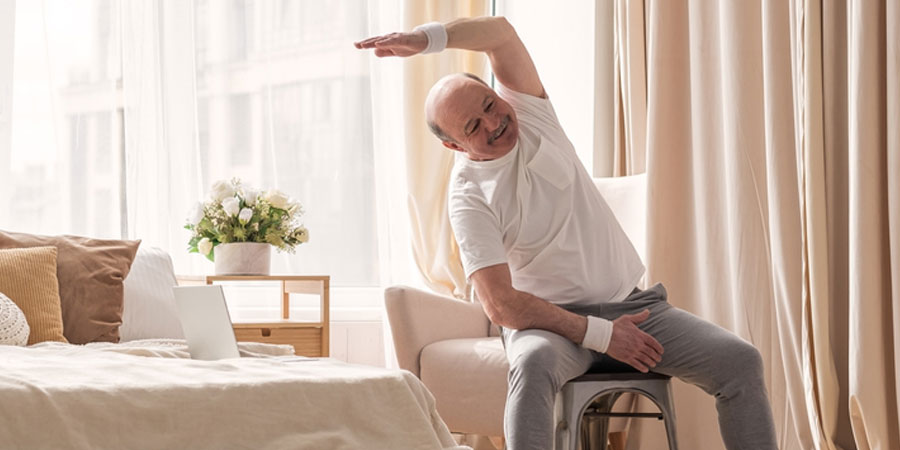5 easy tips to stay physically and mentally active in later life

As you get older, it’s crucial to stay active to look after both your physical and mental health.
Regular activity can help your body to stay healthy, enable you to retain your independence, and reduce your risk of developing a range of conditions including heart disease, stroke, type 2 diabetes, some cancers, as well as depression, and dementia.
Being regularly active can also help you to manage your weight, strengthen your muscles and help to stay steady on your feet.
When you exercise, your body releases endorphins which can reduce your perception of pain and trigger a positive feeling in the body.
Exercise for both your body and your mind can improve your mental health by reducing anxiety, depression, and negative feelings, and expand your self-esteem and cognitive function.
But if you don’t know where to start or just need some encouragement or guidance, then check out our top 5 tips for staying active to help you look after your body and your mind.
1. Walking
Walking is considered one of the best forms of exercise, regardless of your age. It’s free, you don’t need any specialist equipment and most people are able to do it.
Aim to get out for a walk at least once a day and make it part of a regular routine, whether it’s on your own or with others.
Walk to a post-box, to the shops, or to your local park, or if you prefer to stay closer to home, enjoy a walk around your garden.
Local groups arrange organised walks for members to enjoy together in a group which can be an excellent way to stay active and socialise at the same time.
2. Embrace technology
The pandemic has encouraged many of us to become more familiar with new technology. Apps such as Zoom, Skype and FaceTime enabled families and friends to stay connected virtually when they were unable to physically be together.
Now that restrictions are relaxing, these apps and others such as social media can still provide invaluable opportunities to improve your mental health and sense of wellbeing.
They can be great tools to keep you connected and able to communicate more effectively with your family and friends, share memories, keep abreast of news in the community, and reach out to people from your past.
The online world also provides numerous e-learning opportunities whether it be physical exercise classes or activities to complement new or existing hobbies and interests. It can also be a source of information on how to access opportunities for physical exercise and social interactions within your local community.
Embracing these technologies can help keep your mind agile, improve memory and increase cognitive longevity, as well as build confidence.
3. Chair exercises
Chair exercises are a safe and effective way to benefit your physical and mental health.
Regularly undertaking a range of chair exercises can increase circulation, coordination, flexibility, strength, posture, and balance. This can reduce the risk of falls and increase your confidence and self-esteem.
Before you begin, make sure you choose a stable chair without wheels or arm rests. Sit with your feet flat on the floor and knees bent at right angles.
Follow professional advice and guidance included in programmes, such as sitting exercises from the NHS to do at home and simple exercises to do at home and chair based exercise classes in the community from Age UK.
4. Pets
Pet ownership has multiple benefits for people in later life. Owning an animal can encourage more activity and provide companionship, affection, and even conversation, alongside sense of purpose and responsibility; all contributing to a greater sense of well-being.
Pets in the home can also increase levels of ‘happy hormones’ in their owners, and can calm anxieties, lower stress levels, and reduce blood pressure.
Dog ownership, in particular, provides the opportunity to undertake regular physical activity outside in the fresh air and enables you to meet new people.
5. Puzzling and gaming
Regularly tacking puzzles and games can provide a great mental workout. Puzzles such as Sudoku or word searches, or, playing games like chess, bridge, or bingo can improve memory, concentration, cognitive skills, and sharpen logic and reasoning.
They can also provide the opportunity for social interaction and stimulation when playing with friends and family both at home and in the local community.
It’s never too late to start
It’s important to remember that it’s never too late to start making changes to the way you look after yourself, whatever age you are. If you have been inactive for a while, just start slowly and gradually build up.
Keeping both your mind and body active really can improve the length and quality of the life you live.
Our Live-In Carers support our clients in keeping active. They arrange and accompany clients taking part in physical activities within the community as well as providing companionship and regular social interaction inside the home to aid mental fitness. An Eximius Live-In Carer can make staying mentally and physically active in later life just a little bit easier.
If you or a loved one would like to understand more about whether live-in care might be the right fit for you, please get in contact, we’d love to help.